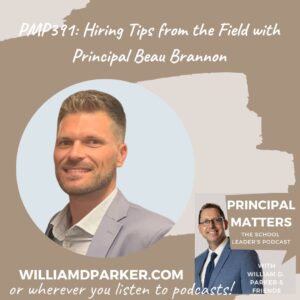Podcast: Play in new window | Download
Spring time is here, and the landscape is green with new growth. Ironically, my wife told me that by the spring of each school year, she has decided that our marriage is falling apart, our kids all need counseling, and we have chosen to the wrong places to live, work, etc.

In other words, she has finally realized that this time of school year is often the most stressful time. Thankfully, by summer break, life seems more balanced again.
This may be no surprise for you. Right now, you may be busy with testing, sports, activities, and planning for assemblies or graduations this time of year. Along with stress, we often see an increase in conflicts, and even with conflicts among our teachers, parents, or other community members.
Last week, Jen Schwanke, and I hosted an episode dedicated to managing difficult conversations with adults. You can check out that post HERE. This week, we recorded a follow-up episode to talk more about this important part of your job.
10 Reflections for Managing Adult Conflict
Whether you are managing conflicts with parents, teachers, or other adults, here are some thoughts to keep in mind:
1. Recognize your own bias.
Believe it or not, sometimes you don’t clearly see a conflict because of your own biases. This may be the way you perceive others or even behaviors or words that “set you off” in conversations. You may unknowingly have “favorites” among your staff, and this can also make it difficult to stay objective. Recognize these realities, and then approach each conflict with an openness toward understanding and finding solutions.
2. Be open to listening (on your timeline when possible).
People want to know they are understood. So the first step to resolving conflict is validating the need for others to be heard. This doesn’t mean, however, that you cannot set boundaries. On the contrary, you want to invite people to talk when it can be most productive and with limits on time. This creates a sense of control for all involved.
3. When meeting in person, be aware of body language.
Don’t cross your arms or clench your fists. Keep an open posture and engage with good eye-to-eye contact. These small gestures go a long way in assuring the other person that you are open to listening and don’t feel threatened by their conversation. Of course, if you have a person who is escalating or becoming aggressive, you want to set the ground rules for a good conversation and have back up plans for those especially tricky scenarios.
4. Think about the physical environment.
Your office should be a professional setting where others feel welcome and respect that you are someone demonstrating competence, not chaos. Most people don’t like “going to the principal’s office,” so keep that in mind so that yours is a welcoming place. Others should feel like a guest, not an intruder, when meeting with you.
5. Don’t let your ego get in the way.
The goal in conflict resolution is finding solutions, not being right or wrong. Don’t let your pride become a stumbling block for active listening and service to others.
6. Keep the others’ perspectives in mind.
This happens in many ways: You will want to articulate what you know about their feelings. Take notes on what is being said. Repeat back what you hear others saying. And provide ideas on solutions in line with your normal policies and practices. With adult conflicts, you may simply need to provide a safe place for people to express their thoughts and feelings, even if there is not a final solution that works for everyone.
7. Be an ally.
Don’t fall into the trap of taking sides. The goal is to help others find solutions. When is the last time someone offered you criticism with goal of helping you grow and improve? That should be the attitude you have when helping resolve conflict.
8. Identify tactics and keep the conversation focused.
People will try all kinds of strategies to keep from talking about what really matters. Don’t allow tears, fears, anger, silence or blaming to push you away from the goal at hand. If possible, take notes when you are in a difficult conversation. This makes you an active listener and serves as good documentation. Don’t be afraid to say, “I feel like we’re getting off topic. Let’s talk about the goal we are trying to reach.”
9. Articulate an end time.
If possible, set a time limit on conversations. This provides and goal for the meeting and gives participants a sense of control, which is important for everyone involved.
10. Know your exit strategy, have backup, and know when to ask for help.
Whether you stand up when a meeting is over, or have your secretary call-in to remind you of your next appointment, plan ahead of time for how to wrap up a meeting. If you’re anticipating a meeting may escalate in emotion, have someone else in the room, leave the door open, or have another staff person standing by just in case you need a witness or extra support.
Let’s Wrap This Up
The goal of managing conflicts with other adults is to help find a solution so that students and the entire school community are better served. No matter how much agreement or disagreement happens in a difficult conversation, end with a personal touch. This may involve shaking hands and thanking them for talking together. Later, consider following up later with a phone call or text to make sure the person(s) you talk to know that you value them and their time — even you don’t agree on the final solution.
Now It’s Your Turn
No amount of preparation guarantees a positive outcome, but you can improve your ability to resolve conflicts, manage disagreements, and reach solutions. What is one new step you can begin taking when mediating or managing conflicts among adults in your school?
Sign-Up For Free Updates and Ebook
When you enter your email address below, you will automatically receive my newest posts and a free Ebook, 8 Hats: Essential Roles for School Leaders. Let’s keep learning together!
Subscribe for free weekly updates and receive free e-book!
(function($) {window.fnames = new Array(); window.ftypes = new Array();fnames[0]=’EMAIL’;ftypes[0]=’email’;fnames[1]=’FNAME’;ftypes[1]=’text’;fnames[2]=’LNAME’;ftypes[2]=’text’;}(jQuery));var $mcj = jQuery.noConflict(true);
Principal Matters–The Book!

School leaders are very busy, so each of the twenty-four chapters is designed as a quick-read and followed with take-action questions for follow-up or reflection. If you want practical ideas on understanding your purpose, managing school teams, dealing with challenges, and leading with courage, action, motivation, and teamwork, go HERE to pick up a copy for you or your team.
Messaging Matters

Harness the power of messaging to create a culture of acknowledgment, respect, and celebration. Written specially for leaders, this title is divided into three parts, helping readers to maximize their role as chief communicators with students, teachers, and parents and community. Each chapter includes suggestions for using digital tools to enhance messaging and ends with reflection questions and practical next steps.


